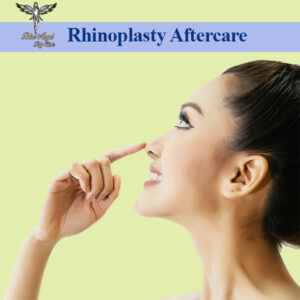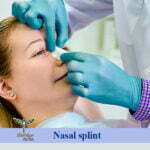Although rhinoplasty is considered a safe procedure, it is necessary to follow the instructions recommended by the best rhinoplasty surgeon in Dubai for post-op care. Rhinoplasty aftercare instruction will help you to have an easier recovery and the risk of possible complications after the operation will be greatly reduced. Call or visit Blue Angel Poly Clinic if you need guidance after a nose job.

Basic tips regarding rhinoplasty aftercare
Avoid touching your nose for the first few days after rhinoplasty. Elevate your head (even while sleeping by placing several pillows under your head) during the first few nights after surgery. The best rhinoplasty surgeon in Dubai advises you to lie down on a soft chair while resting to help the healing process.
To relieve any discomfort and reduce the natural swelling around the nose and eyes, it is better to use a cold compress (a bag containing ice covered in a clean towel or a bag containing frozen peas kept in the refrigerator) in the first 48 hours after rhinoplasty.
Place a clean wet washcloth on each of your eyes at twenty-minute intervals. Change the clothes every so often to keep cool in the treatment area. By following these instructions after the first few days, you will notice that your healing process has progressed greatly.
Although no post-surgery risk is unexpected or impossible, there are some measures you can take to minimize possible risks and side effects after nose surgery, which are rhinoplasty aftercare. Nose is:
Take care of your new nose.
A splint or cast will be placed on your new nose in the first week after rhinoplasty. The purpose of putting this splint or plaster is to help the nasal skeleton to maintain and adapt to its new structure. It goes without saying that after removing the cast or splint, which of course is done by the best plastic surgeon in Dubai, you still need to protect your nose from any trauma or injury.
Sleep with your head elevated.
In the first few days after rhinoplasty, try to keep your head a little high and avoid touching this organ with pillows or other objects.
Avoid vigorous and heavy activities.
It takes 3 to 6 weeks for your nose to fully heal after surgery. Even when you feel better during this time and imagine that your body is in a very good position, you should avoid strenuous activities or anything that is considered dangerous for your new nose.
Daily rhinoplasty aftercare
Daily rhinoplasty aftercare is very simple. Your healthcare provider will review these steps with you after the procedure. If you have any questions or concerns related to the rhinoplasty, your doctor will guide you. In the continuation of the article, the types of side effects that you may expect after the surgery are mentioned:
Swelling – Most of the swelling should go down within two to three weeks after surgery, but sometimes it can take up to three months for the swelling to go away completely. In the first few days after rhinoplasty, the swelling will increase and reach its maximum level, and your nose will still look swollen after the splint is removed. Don’t worry, this is also part of the healing process and rhinoplasty aftercare instructions will improve them.
Discoloration – Discoloration and bruising sometimes appear around the nose surgery site. Some patients experience bright yellow bruises, while others experience bluish and red bruises. This case is different in people, but its occurrence along with severe pain is not considered normal and should be reported to the best rhinoplasty surgeon in Dubai.
Numbness – As your nose heals, you may experience numbness, tingling, or mild pain and itching.
Bleeding – From time to time, a slight nosebleed may occur, but normally, this bleeding should stop quickly. Gently squeeze your nose and wait for the bleeding to stop. If bleeding lasts longer than 10-15 minutes, please call your doctor.
Depression – Some patients feel mildly depressed or hopeless after cosmetic surgery. Of course, since the swelling is decreasing and the healing process is progressing and the patient will gradually see a better result in his nose, this condition will disappear automatically. It sometimes takes two to three months for your nose to fully heal, so be patient during this time and do the rhinoplasty aftercare.
Glasses – If you wear glasses, talk to your doctor about how to protect your nose from deformation caused by the pressure of the glasses. You can wear glasses as long as the splint is on your nose, but after removing the splint, you should suspend the glasses by resting them on your forehead or cheeks so that there is no pressure on your nose. It is usually safe to wear contact lenses for two weeks after surgery. The best rhinoplasty surgeon in Dubai will share options with you to make sure that your vision is not disturbed during this time.
What you should not do as rhinoplasty aftercare:
During the first two weeks after rhinoplasty, avoid vigorous exercise or physical activity, pulling clothing over the face when taking it off, picking and rubbing the nose, or any other facial movements (such as yawning or chewing vigorously).
You should also use a soft toothbrush to clean the upper teeth during the first two weeks after the operation. Try to avoid driving, strenuous exercise, swimming, and activities that put your nose at the risk of injury or infection.
During the first week after rhinoplasty, try to spend most of your time at home so that you don’t need to wear a mask when you leave the house during the coronavirus pandemic. So you won’t have to worry about wearing a mask. When you feel ready to be in the community and get out of the house, and on the other hand, you have to wear a mask, be sure to use a cloth mask. Also, the mask should not be tight and should fit very loosely on your nose.
Nutrition after nose surgery
One of the most important things to care for after nose surgery is your diet because it can make your recovery period easier and pave the way for a quick recovery. Having Good nutrition as one of the rhinoplasty aftercare instructions will help you get the best results from your rhinoplasty and minimize post-operative side effects. Therefore, it is important to know what foods can help your body to go through the recovery process successfully because the right diet will ensure optimal recovery.
Digestion is difficult after almost any type of surgery. For this reason, most patients suffer from constipation after surgery, and the best way to prevent this and deal with it is to follow a proper diet. Be sure to ask your surgeon in the best plastic surgery clinic in Dubai to give you rhinoplasty aftercare instructions on proper foods during the recovery period. Here is a list of the best foods for recovery:
Soft foods: To help the body and digestive system, and considering the difficulty of chewing hard foods after nose surgery, it is highly recommended to eat soft foods during recovery after surgery, such as apples. Sauce, yogurt, eggs, mashed potatoes, chicken soup, etc. are suitable options.
High-fiber foods: Eating high-fiber foods during the recovery period after surgery is highly recommended. This type of food strengthens natural bowel movements and helps digestion. Some of these foods include:
- Cereals such as spaghetti, brown rice, whole wheat bread, and popcorn
- Fresh fruits such as apples, oranges, strawberries, pears
- Fresh vegetables such as cooked carrots, boiled potatoes, boiled green peas and broccoli, and cooked spinach.
Anti-inflammatory foods: One of the most important foods that should be included in the diet after nose surgery is anti-inflammatory foods. These foods help reduce inflammation and heal wounds much faster and easier.
Wound healing foods: Another group of foods that should be eaten during recovery after nose surgery are wound healing foods. These foods help the wound heal faster and include protein-rich foods such as meat, fish, eggs, yogurt, vitamin A-rich foods such as carrots, oranges, dark leafy vegetables such as spinach, and vitamin C-rich foods such as citrus fruits. to be
Fresh fruits and vegetables: Fresh fruits and vegetables are one of the most important post-operative nutrients due to their many benefits and being rich in vitamins and minerals.
Other rhinoplasty aftercare
How to wash your face
Wash your face daily to keep your skin clean and prevent infection near the incision site. It is important to use a mild and odorless cleansing product to wash your face. The doctor advises you to do it gently when cleaning your face so that the healing process is not disturbed and the result of the surgery is not a problem, and at the same time, cleaning the skin as a part of rhinoplasty aftercare. done correctly To prevent the skin from drying out or feeling itchy during the recovery period, it is better to use a hypoallergenic fragrance-free moisturizer after washing your face.
Prohibition of alcohol and smoking
During rhinoplasty aftercare, the ban on alcohol and smoking is one of the most important pieces of advice. The reason for all this emphasis on quitting these two items, sometime before the start of the surgical procedure and continuing to quit until sometime after the procedure, is that smoking weakens the blood circulation in the veins and leads to narrowing. blood vessels, oxygen does not reach enough cells that are trying to repair the surgical area. As a result of this lack of oxygen, part of the tissue becomes dead and the recovery progresses at a slow speed. On the contrary, good blood flow provides a rich source of oxygen and nutrients to the cells, and as a result, the skin will have good health and vitality.
Alcohol also causes disturbances in the effective effect of anesthetics. Alcohol and anesthetic drugs can interfere with each other and this will cause problems for the patient. Another harmful effect of alcohol is its effect on dry skin. People who consume alcohol, compared to non-alcoholic people, urinate more often, and as a result, their body water is excreted more. This reduces the freshness of the skin and slows down the healing process.
Cleaning the nose with a cotton swab
Another rhinoplasty aftercare tip that is important and must be remembered is how to clean the nose. Some patients question whether a q-tip can be used to clean blood from inside the nostrils or not. You have to be very careful while doing this.
It is safe to use a cotton swab near the edges of the nostrils, but as the rhinoplasty surgeon in the best plastic surgery clinic in Dubai, you should avoid inserting it into the nose. If you try to remove what is stuck to the inner wall of your nose during the healing process, you may cause serious damage to the treated structures.
Dip the tip of the ear swab in saline solution or diluted hydrogen peroxide and gently rub the ear swab over the dried blood near the nostril until it separates on its own. You can wash the outside of the nose 7-10 days after the operation, that is, when the nasal plaster is removed. Be sure to do this very gently until the sixth week after the operation.



